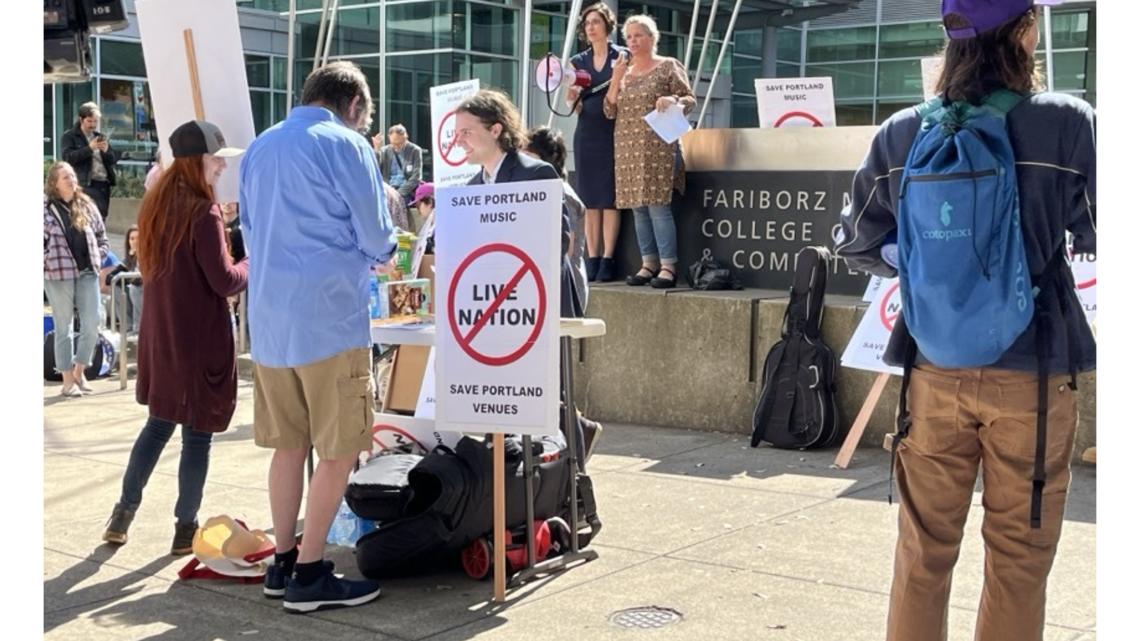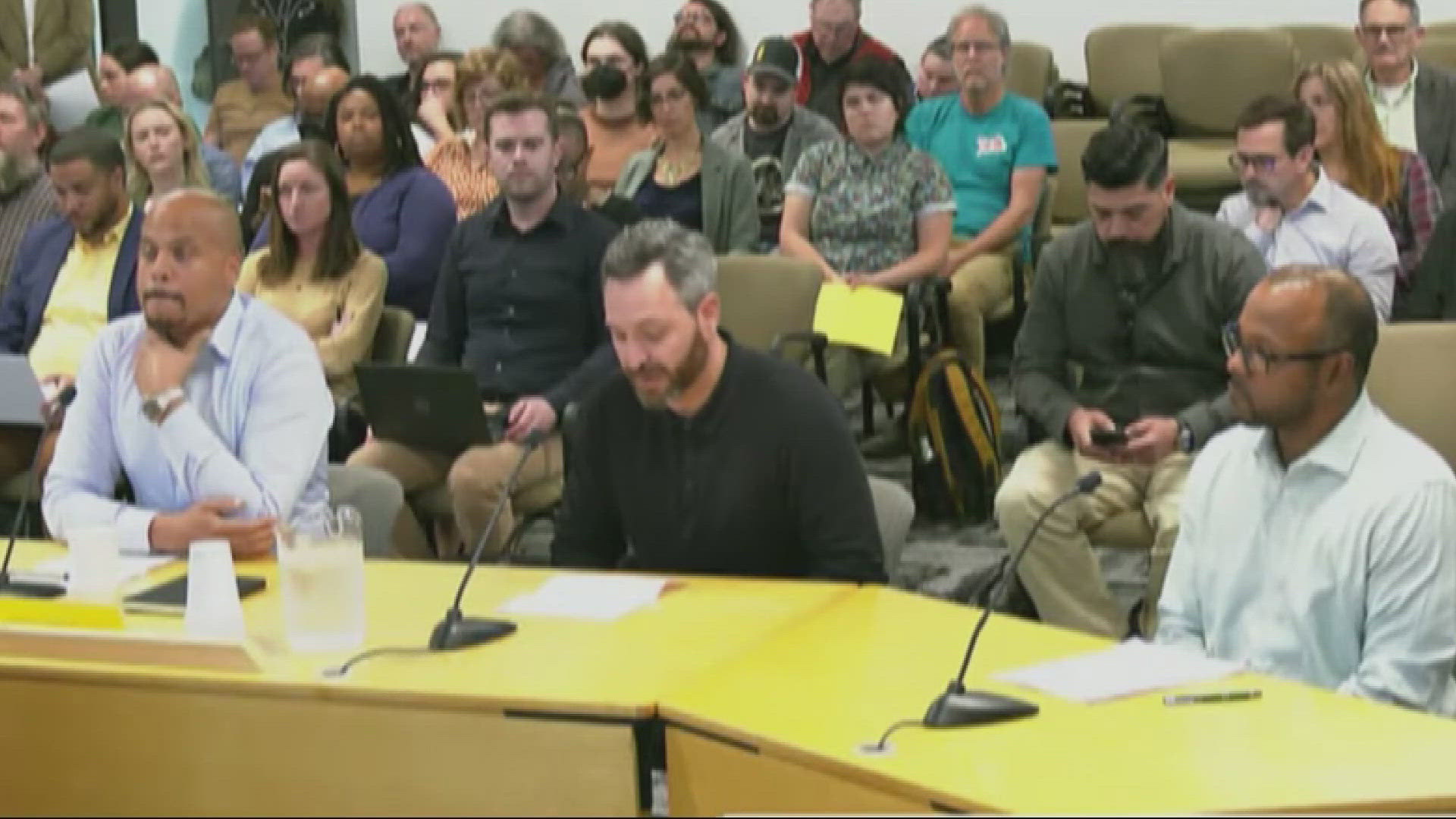PORTLAND, Ore. — A proposal to bring a Live Nation venue to Portland has received significant pushback, and dozens of people testified Thursday in support of an appeal against the world’s largest entertainment company building a 3,500-seat concert hall in the Central Eastside.
Portland City Council tentatively denied the appeal Thursday and asked that both sides return with revised findings for whether the Live Nation venue should proceed in its proposed location near Hawthorne Bridge.
The board of commissioners for Prosper Portland, the city’s economic development agency, approved selling a vacant city block to the developers planning to lease it to Live Nation on Wednesday.
Critics of the plan have called into question Live Nation’s businesses practices, which were described in testimony as a “monopoly,” “exploitive” and “predatory.” Many fear the impact the company could have on Portland’s thriving but fragile independent music industry.
In over 160 pieces of written testimony submitted prior to the Portland City Council meeting, the phrases “please do not let Live Nation into our city” and “do not let Live Nation ruin Portland” routinely popped up. The same theme continued in person during Thursday’s meeting, where over 25 spoke against inviting Live Nation into the city.
“There’s some real life-and-death safety stuff here at hand, regardless of the death sentence that this will be to local events and venues letting Live Nation come in,” said Katie Dalziel, a local film and video producer.


Economics and benefits
MusicPortland, a nonprofit advocacy group for Oregon’s music industry, formally appealed Live Nation’s plan to the city council after a city hearings officer approved the site to be used as a concert venue through a conditional use review; a process that’s required if a project may have adverse impacts on an area, typically through traffic, light and noise.
But under Portland’s city code there is also an additional requirement for these reviews: benefit. And that definition is what Thursday’s hearing tussled with.
Most projects that require a conditional use permit, including major event centers, must show that the “public benefits of the proposed use outweigh any impacts that cannot be mitigated.”
Damien Hall, a lawyer representing the developers Colas Construction and Beam Development, argued that the project does this, as it would transform a long-vacant block, bring “vibrancy” and foot-traffic for businesses, decrease crime through activity and be an economic driver.
MusicPortland contends that the “impacts” should consider the economic and business practices alleged in the U.S. Department of Justice’s antitrust lawsuit against Live Nation, which 30 other states, including Oregon, have joined. The lawsuit accuses Live Nation of running “an illegal monopoly” over live events in the U.S., including blocking venues from using multiple ticket sellers other than Ticketmaster.
“What we have challenged is that economic benefit and what that does to the music industry,” said Carrie Richter, the lawyer representing MusicPortland, at Thursday’s hearing. “You may decide that the public benefit of fixing up the Central Eastside outweighs the impact to the music industry.”
As such, Portland City Council was limited in its judicial control in Thursday’s hearing. Because it was a land use hearing, Mayor Ted Wheeler said they could only consider whether the hearings officer appropriately approved and applied the criteria correctly.
“The question of whether we like the person is separate,” Wheeler said.
A representative of the city attorney's office injected that it’s the land’s “use” that needs to be judged, which in this case would be a music venue, and not its future tenant.
Train traffic
The other main argument in MusicPortland’s appeal deals with the train tracks. The Live Nation venue is proposed near Hawthorne Bridge on Southeast Water Avenue between Salmon Street and Main Street.
“MusicPortland filed this appeal not only because of the damage that Live Nation would do,” Richter said. “This venue is in the wrong place.”
Richter argues that many concertgoers could be stuck at night and in the rain if there’s a train blocking the path, which could prove to be dangerous if temptation mounts to jump the tracks.
“They’re not going to be able to see their band and they’re going to sit there and watch a train sit there and they’re going to think I can cross,” Richter added. “Or their friends are going to get each other to cross and then the train is going to start, and something is going to happen, and somebody is going to get hurt or they’re going to get killed.”
Conclusion
While commissioners heard all of these concerns, it was brought to their attention that it may not be the "right forum" to discuss Live Nation's business practices.
"I'm not sure it's a land-use consideration," Commissioner Rene Gonzalez said.
Wheeler echoed this in saying "I have not heard what I think are sufficient reasons to overturn the hearing officer's determination."
"Our scope here is narrow," he added.
With commissioners voting unanimously to deny the appeal, backers of the project rejoiced in statements released Thursday evening. Those included Andrew Colas, president and CEO of Colas Construction, and Jonathan Malsin, principal of Beam Development.
“This approval affirms that we have met all land use requirements and are eager to move forward with construction," Colas and Malsin said. "Our project will create jobs, foster a positive economic impact, and energize the neighborhood. We are grateful to all who voiced their support, as well as those who expressed concerns. We genuinely care about our City and will use this valuable feedback to build an exceptional community asset that brings Portlanders together. This is a win for Portland!”
“We’re proud to partner with Beam Development and Colas Development Group on this project to bring more shows and economic development to Portland," Mary Clare Bourjaily, Live Nation market president for Oregon, said in a statement. "As members of Portland’s vibrant music ecosystem, we look forward to continuing to engage with the community to share more about how this project will benefit the local fans and artists.”
Portland City Council is expected to return Oct. 2 for a final vote.

